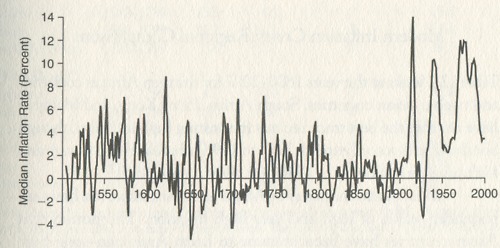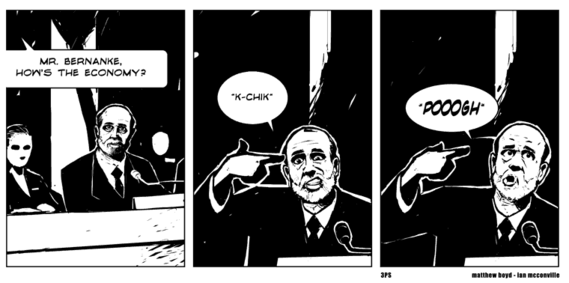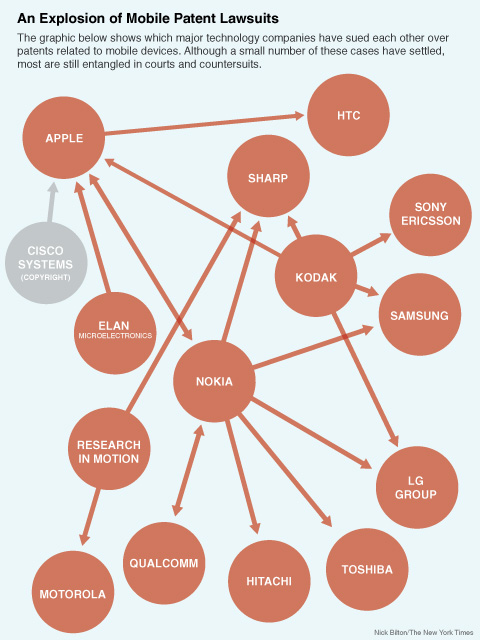I'm in Thailand now—really jetlagged—but I wanted to share the view out the airplane window on our approach into BKK.
The rain has stopped, with none in the forecast for at least a week in either direction, but this country's crisis is not over.
I'm in Thailand now—really jetlagged—but I wanted to share the view out the airplane window on our approach into BKK.
The rain has stopped, with none in the forecast for at least a week in either direction, but this country's crisis is not over.
Reading This Time Is Different has taught me a lot about economic history, but it's taken a while because it's written very much like a dry academic paper than most nonfiction. Good news: it also has pretty pictures.

This graph struck me as very telling of our age—while the 10-year average inflation rate is always positive, only in the last generation has it stopped dipping below 0 every so often, and all of the most recent local maxima are higher than any age before.
From the book (page 179):
Perhaps it may seem excessive to devote so much attention here to currency debasement when financial crises have long since moved on to grander and more extravagant schemes. Yet the experience of debasement illustrates many important points. Of course, it shows that inflation and default are nothing new; only the tools have changed. More important, the shift from metallic to paper currency provides an important example of the fact that technological innovation does not necessarily create entirely new kinds of financial crises but can exacerbate their effects, much as technology has constantly made warfare more deadly over the course of history.
That's one hell of an analogy. The book goes on to explain that inflation is a tool used by sovereigns to reduce the value of debt owed, but the occurrence of sovereign default hasn't changed commensurately over the course of the graph.
And in case you don't follow Three Panel Soul:

Verizon on today's FCC vote:
There is no doubt that the policies put in place by the Clinton Administration and the Bush Administration to jumpstart innovation and the spread of broadband worked. As a result, America’s broadband and Internet marketplace is intensely competitive and an engine of economic growth, job creation and multibillion-dollar investment. Today’s decision, however, unnecessarily departs from these successful policies.
I'm sure on Verizon's planet there's no lack of healthy competition, but back at nulamihaus we have no competitive alternative to Comcast. My brother-in-law's complex is served exclusively by AT&T. And then there's the Woz:
I have owned four homes in my life. None of these had cable TV, even though one was a new development where the law required cable. None of these had DSL, including my current home, which is only .8 miles up a hill from the populous town I live in. I pay for a T1 line, which costs many times what DSL runs for about 1/10 the bandwidth. That's as close as I can come to broadband where I live. The local phone providers don't have any obligation to serve all of their phone customers with DSL. They also have no requirement to service everyone living in the geographic area for which they have a monopoly. This is what has happened without regulatory control, despite every politician and president and CEO and PR person since the beginning of the Internet boon saying how important it was to ensure that everyone be provided broadband access.
Wired ISPs are local monopolies. An alternative that comes at twice the cost and half the speed is not "intensely competitive". Consider a car analogy: residents of California can only buy Chevrolet vehicles—if you want Ford you'll have to move to Montana. Don't like it? You can buy a bicycle for twice the price. People accept their choice of one decent broadband option because they liken it to their one choice of power or sewer company, and the market accepts the existence of multiple ISPs as proof of a competitive marketplace.
If the marketplace were as fierce as Verizon describes I'd be willing to yield to market forces—and today's FCC ruling gives more leeway to wireless providers, who are arguably heavily competitive—but wired ISPs today aren't competing, they're sharing the spoils of what amounts to industrial gerrymandering.
Google's earliest financial data for PALM shows them trading at $541.688 per share.
during the Palm Pilot era, they probably peaked even higher.
at time of this writing, they are trading at four dollars and five cents per share.
from The New York Times, a neat infographic:

note how the number of edges emanating from a company is an indicator of its health1. Kodak has been dying since the commoditization of the digital camera. Nokia started to crumble when the iPhone went global. conversely, HTC is doin' all right—they even split last year.
filing lawsuits is an indicator that you've lost your innovative edge. losing the lead, you're exploiting what's left out of your inventions and legacy until you've finally converted all your integrity into bankruptcy. the news will enjoy adding their spin as well, further complicating things.
whether founded or not, these impressions taint your reputation. they damage your business.
Can you name a company you admire that spends its time enforcing patents, instead of innovating? Remember the pirate flag you flew over Apple's headquarters when you were building the Mac? Is Apple part of the Navy now?Wil Shipley
who cares if someone took your ideas to build a competing product? that's how the market works. build the better product—it can't be hard if all your competition can only manage plagiarism.
I hope this passes soon so we can get back to creating the future.
Flash evangelist Lee Brimelow made his little poster showing what a bunch of Flash-using web sites look like without Flash without actually looking to see how they render on MobileSafari. Ends up a bunch of them, including the porno site, already have iPhone-optimized versions with no blue boxes, and video that plays just fine as straight-up H.264. iPhone visitors to these sites have no idea they’re missing anything because, well, they’re not missing anything. For a few other of the sites Brimelow cited, like Disney and Spongebob Squarepants, there are dedicated native iPhone apps.
Kendall Helmstetter Gelner put together this version of Brimelow’s chart using actual screenshots from MobileSafari, the App Store, and native iPhone apps. The only two blue boxes left: FarmVille and Hulu.John Gruber
pretty damning that Brimelow could only find two good examples for his Apple roast, including the porn card he chose. I'm on the fence on the Flash debate, but I keep finding it harder and harder to justify.
My straight marriage is under more threat from discriminatory anti-gay voters than from same-sex couples wanting to be similarly recognized. I got married in order to embark upon a commitment of mutuality and love, not join a private country club for straights only. I am astounded by the shallowness of a legal and moral definition of marriage which privileges the sex of its participants beyond all other criteria Tom Ryberg
this is why Cindy and I have postponed our marriage indefinitely. as much as we'd like to enjoy the tax and legal benefits, it is not fair to our friends. their relationships are just as loving and devoted as ours.
this is one hell of an apology. down to the very last line:
So on behalf of the British government, and all those who live freely thanks to Alan’s work I am very proud to say: we’re sorry, you deserved so much better.
mind you, given Turing's accomplishments1, no apology could truly make good after what was done to him.
I just can't help thinking: that man deserves his revenge… and we deserve to die.